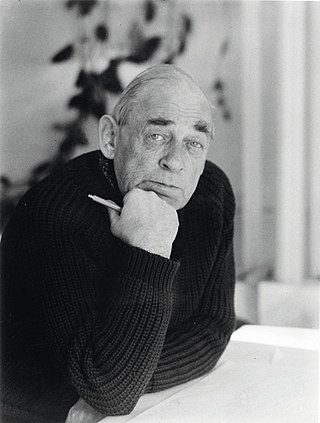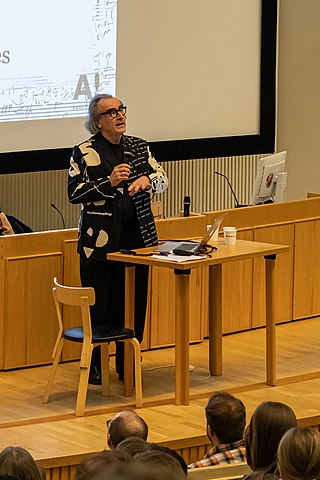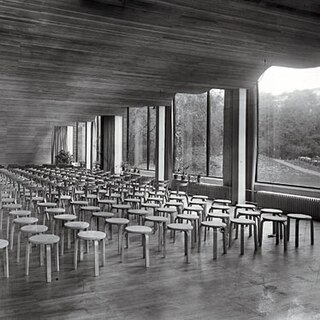
Hugo Alvar Henrik Aalto was a Finnish architect and designer. His work includes architecture, furniture, textiles and glassware, as well as sculptures and paintings. He never regarded himself as an artist, seeing painting and sculpture as "branches of the tree whose trunk is architecture." Aalto's early career ran in parallel with the rapid economic growth and industrialization of Finland during the first half of the 20th century. Many of his clients were industrialists, among them the Ahlström-Gullichsen family, who became his patrons. The span of his career, from the 1920s to the 1970s, is reflected in the styles of his work, ranging from Nordic Classicism of the early work, to a rational International Style Modernism during the 1930s to a more organic modernist style from the 1940s onwards.

Georg Henrik von Wright was a Finnish philosopher.

Pekka Himanen is a Finnish philosopher.

Esa Jouni Olavi Saarinen is a Finnish philosopher who was a professor of applied philosophy at Aalto University and co-director of the Systems Intelligence Research Group. until his retirement in 2021.

Eino Sakari Kaila was a Finnish philosopher, critic and teacher. He worked in numerous fields including psychology, physics and theater, and attempted to find unifying principles behind various branches of human and natural sciences.

Yrjö Kalervo Sotamaa is a Finnish designer and design strategist. Sotamaa is Professor Emeritus of Design Innovation in the Aalto University School of Art, Design and Architecture and President Emeritus of the University of Art and Design Helsinki (TAIK). He served as the president of TAIK from 1986 until 2008. He earned his MA in Interior Architecture and Furniture Design from TAIK, where he studied with Kaj Franck and Antti Nurmesniemi.
Matti Häyry is Professor of Philosophy at Aalto University School of Business in Helsinki, Finland. In 2004-2013, he was Professor of Bioethics and Philosophy of Law at the University of Manchester in England, and before that he held professorships in philosophy and moral philosophy at the universities of Central Lancashire and Kuopio.

Kari Peter Conrad von Bagh was a Finnish film historian and director. Von Bagh worked as the head of the Finnish Film Archive. He was the editor-in-chief of Filmihullu magazine and co-founder and director of the Midnight Sun Film Festival. Since 2001, he had been the artistic director of the film festival Il Cinema Ritrovato in Bologna. Von Bagh was a member of the jury in the competition category of 2004 Cannes Film Festival.

Vyborg Library is a library in Vyborg, Russia, built during the time of Finnish sovereignty, before the Finnish city of Viipuri was annexed by the former USSR and its Finnish name was changed to Vyborg by the Soviet authorities.

Teemu Tuomas Mäki is a Finnish artist, theatre director and writer. He was born in Lapua, and was one of the first Finnish artists to gain a doctorate. In 2008–2013 he was the Professor of Fine Arts in Aalto University. Before and after that he has worked as a freelancer.

Espoonlahti (Finnish) or Esboviken (Swedish) is one of the five major urban areas of Espoo, a city in Finland. It lies along the south-western coast of Espoo, bounded to the west by the bay of the same name, to the south by the shores of the Gulf of Finland, to the west by the Finnoo (Finnå) valley, to the east of the municipal border of Kirkkonummi, and to the north by the forests of Espoo central forest area. This total area of about 4,800 hectares is further divided into areas called Soukka, Suvisaaristo, Kaitaa, Nöykkiö, Latokaski and Saunalahti, with one greater center called Espoonlahden keskus. Areas known as Laurinlahti, Ylä-Kivenlahti, Ala-Kivenlahti and Iivisniemi are also part of the Espoonlahti district. Yet another name pertinent to this area is Kanta-Espoonlahti, which includes Espoonlahden keskus, Soukanmäki, Kivenlahti, Laurinlahti and Soukanniemi.

Yrjö Erik Mikael Saarela was a Finnish wrestler, who won an Olympic gold and a world championship.

Jalmari Verneri Sauli was a Finnish writer and track and field athlete who competed in the 1908 Summer Olympics.

Juha Sihvola was a Finnish philosopher and historian. He was a university professor of general history from 2000, and part of The Academy of Finland's Centre of Excellence program upon Philosophical Psychology, Morality and Politics, serving as the Deputy Director of the Centre of Excellence from 2008. In the years 2004–2009, he was the Director of Helsinki Collegium for Advanced Studies.

Elisa Aaltola is a Finnish philosopher, specialised in animal philosophy, moral psychology and environmental philosophy.

The Academic Female Voice Choir Lyran, also referred to as simply Lyran, is a Finland-Swedish academic female voice choir in Helsinki, Finland. It is the only women's choir affiliated with the University of Helsinki.
Pauli Pylkkö is a Finnish philosopher. He was a student of Jaakko Hintikka, and later a professor and a researcher in both the United States and Finland. Pylkkö has addressed such topics as logic, semiotics, philosophy of language, and cognitive science. Pylkkö has published several works focused specifically on the philosophy of Martin Heidegger, and his works have examined the often problematic relationships between language and subjectivity, nationalism, the limits of scientific rationality, and the semiotic and linguistic mechanics of fascism. His work has also aroused interest in theological research.

Paavo Viljo Tynell was a Finnish designer who is best known for his lighting fixtures and lamps. Among other things, Tynell designed the lighting for the office of the Secretary-General of the United Nations in New York and for the Parliament House and Lasipalatsi building in Helsinki.

Ancient kings of Finland are kings of Finland mentioned in early historical sources. The word kuningas is an old Finnic word deriving from the ancient Germanic word kuningaz. In the time the sources were written, "Finland" mainly referred to the Finland Proper area, and depending on the source, the "kings of Finland" could also refer to kings of the Sami people.
The history of Finnish philosophy ranges from the prehistoric period to contemporary philosophy.
















